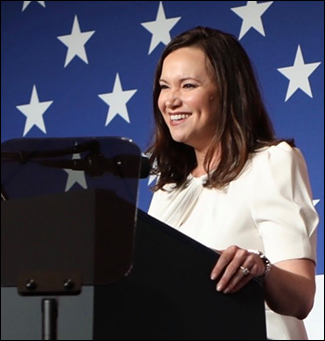By Jim Ellis — Monday, Aug. 11, 2025
Senate

Former Florida Attorney General and current US Sen. Ashley Moody
Educator and 2025 special election congressional nominee Josh Weil (D) announced that he is dropping his US Senate bid. Weil says a health condition prevents him from continuing his campaign. Earlier this year, he ran as a socialist in a conservative district but managed to raise more than $15 million mostly from national sources. Weil lost to now-Rep. Randy Fine (R-Melbourne Beach) by a 57-43 percent margin in the April special election.
Nine Democrats remain in the primary race. Former Congressman Alan Grayson is the only contender ever elected to office. Appointed Sen. Ashley Moody (R) is competing in the 2026 statewide special election to serve the balance of the current Senate term. Gov. Ron DeSantis (R) appointed Moody, then the state’s Attorney General, to replace Marco Rubio, who was appointed US Secretary of State.
Iowa — Two more Democrats are coming forward to enter the 2026 US Senate primary. Des Moines School Board chair Jackie Norris, a former chief of staff to First Lady Michelle Obama, announced during the week that she will enter the Senate primary. Expected to soon declare is state Rep. Josh Turek (D-Council Bluffs).
Already in the Democratic primary are state Sen. Zach Wahls (D-Des Moines) and state Rep. J.D. Scholten (D-Sioux City). The eventual party nominee will challenge Sen. Joni Ernst (R) in the general election.
House
AL-1 — In anticipation of Rep. Barry Moore (R-Enterprise) announcing for the Senate on Aug. 15, former US Rep. Jerry Carl (R), who lost to Moore when the two were paired in one district after a 2023 court-ordered redistricting, has filed a 2026 congressional committee with the Federal Election Commission. The move further suggests that Carl will attempt a political comeback once Rep. Moore officially declares for the open Senate seat as expected.
Chances appear strong that ex-Rep. Carl will be able to win the open 1st District Republican primary and the general election in November of 2026. The Dave’s Redistricting App partisan lean calculation for AL-1 is 76.5R – 22.0D.
CA-32 — Jake Levine (D), a former Biden Administration official and son of former Rep. Mel Levine (D-CA), announced his challenge to veteran Rep. Brad Sherman (D-Sherman Oaks). Jake Rakov, a former Sherman staff member who says the Congressman has lost touch with his constituents, is also in the race. It is likely that another Democrat will advance into the general election against Rep. Sherman, who is virtually guaranteed to advance from the June 2, 2026, jungle primary.
CA-45 — Ex-Rep. Michelle Steel (R) announced that she will not return for a re-match against freshman Rep. Derek Tran (D-Orange). After her defeat by a margin of just 563 votes out of nearly 316,000 cast ballots, the second-closest race in the country, Steel filed a 2026 campaign committee with the Federal Election Commission. Now saying she has “other goals,” Steel is abandoning a congressional comeback effort for next year.
The 45th District, which contains parts of Orange and Los Angeles counties, carries a 52.2D – 45.9R partisan lean according to the Dave’s Redistricting App statisticians. Kamala Harris topped President Trump here, 49.3 – 47.8 percent.
IL-16 — Rep. Darin LaHood (R-Peoria), after indicating he was considering entering the 2026 Illinois Governor’s race, has instead decided to seek re-election to a seventh term in the US House. Holding one of only three Illinois Republican seats, Rep. LaHood will be a prohibitive favorite to win both renomination and re-election in 2026.
NV-1 — State Sen. Carrie Buck (R-Henderson) announced that she will challenge veteran Rep. Dina Titus (D-Las Vegas) next year. Republicans have needed a stronger candidate to oppose the Congresswoman in a district that could become highly competitive. Dave’s Redistricting App rates the NV-1 partisan lean as 52.6D – 42.3R, but the presidential races have proven closer. In 2024, Kamala Harris carried the district, but with only a 50.2 – 48.0 percent victory margin. In 2020, President Biden won the seat with a 53.2 – 44.7 percent spread. Rep. Titus will be favored for re-election, but this is a contest that could draw national attention.
NY-1 — Air Traffic Controller and Army National Guard Black Hawk helicopter pilot Chris Gallant (D) announced his intention to compete for the Democratic nomination to challenge two-term Rep. Nick LaLota (R-Suffolk County). In his two congressional races, Rep. LaLota recorded a pair of 55 percent victories. Assuming the district remains in its current configuration, the Congressman will again be a clear favorite for re-election.
Governor
Alaska — Sen. Lisa Murkowski (R), in what could be an off-the-cuff response to a reporter’s question, indicated that she is considering entering the open Governor’s race next year. A crowded field is forming on both sides, but obviously Sen. Murkowski would become a key competitor if she were to run. Gov. Mike Dunleavy (R) is ineligible to seek a third term.
California — Diamond Resorts International time share founder Stephen Cloobeck (D) joined the growing field for the 2026 open Governor’s campaign. Cloobeck began by issuing attack statements against his new opponents, and in particular toward ex-Rep. Katie Porter (D). More than 70 individuals have announced their intention to enter the statewide jungle primary. It remains to be seen just how many qualify for the ballot. It is certain, however, that the June 2, 2026, primary field will be large. Regardless of percentage attained and party affiliation, the top two finishers will advance into the general election.
Maine — Businessman Ben Midgley, the former long-time president of the Planet Fitness national gym company, announced that he will enter what is becoming a crowded open gubernatorial field in both parties. Gov. Janet Mills (D) is ineligible to seek a third term but is not ruling out a challenge to Sen. Susan Collins (R).
In addition to Midgley, state Sen. Jim Libby (R-Cumberland), former Assistant US Secretary of State Bobby Charles, businessman Jonathan Bush, real estate developer David Jones, University of Maine Trustee Owen McCarthy, and Paris Town Supervisor Robert Wessels, appear to be the major Republican candidates.
For the Democrats, Secretary of State Shenna Bellows, former state House Speaker Hannah Pingree, daughter of US Rep. Chellie Pingree (D-North Haven/Portland), businessman Angus King III, son of Sen. Angus King (I), and former state Senate President Troy Jackson are the major contenders. The eventual Democratic nominee will be favored to hold the position.
State and City
Georgia Attorney General — Former state House Minority Leader Bob Trammell (D) announced his candidacy for the open Attorney General’s position during the week. Republican state Sens. Bill Cowsert (R-Athens) and Brian Strickland (R-McDonough) are battling for the Republican nomination. Incumbent Attorney General Chris Carr (R) is running for Governor. Expect a close open seat general election battle for this office.
Kansas Attorney General — 2022 Attorney General nominee Chris Mann (D) announced he will return to seek a re-match with incumbent AG Kris Kobach (R). Three years ago, Kobach won a close 51-49 percent open general election.
Kobach has been controversial over the years especially when losing the 2018 open gubernatorial election to current Gov. Laura Kelly (D). Speculation was that Kobach would again enter the Governor’s race, but there is no recent indication that he will do so. Still, he can expect to see a competitive re-election battle for Attorney General next November.
Detroit Mayor — The Detroit mayoral jungle primary election was held on Aug. 5, and two Democrats advanced into the November general election. City Council President Mary Sheffield exceeded the 50 percent threshold in the first election, but under the Detroit city procedure one cannot win outright even with majority support. Therefore, she advances into an open November general election against second place finisher Solomon Kinloch, a well-known local pastor.
The field featured nine candidates including retired former Detroit Police Chief James Craig who was running as a Republican. Incumbent Mayor Mike Duggan (I) is not seeking a fourth term in order to run for Governor.
Seattle Mayor — In what will be a general election of far-left candidates, community organizer Katie Wilson (D) placed first in the Aug. 5 primary election with Mayor Bruce Harrell (D) finishing a close second among the eight candidates. Neither reached the majority support mark of 50 percent, as both finished in the high 40s. The general election will be highly competitive.







